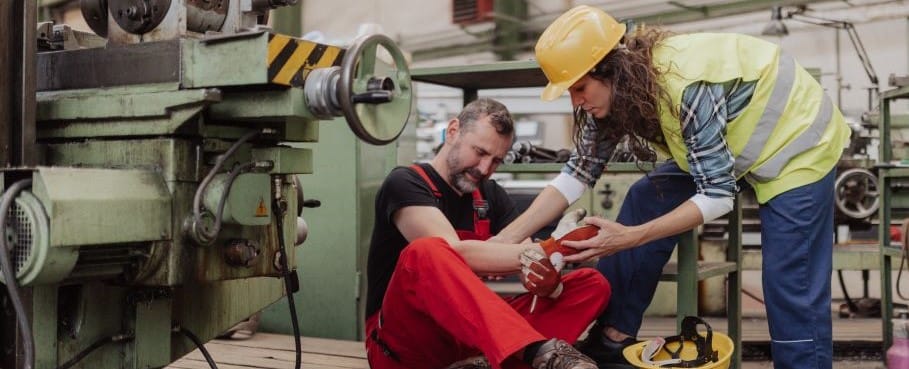
Workers’ Comp Lawyer in Neenah, WI
Your Workers’ Comp Lawyer Near Neenah, WI
Located between Lake Winnebago, the Fox River, and Little Lake Butte Des Morts, Neenah, Wisconsin, has grown into a bustling community with nearly 30,000 residents. Manufacturing is one of the area’s major industries with companies like Neenah Paper and Kimberly-Clark employing nearly 30% of the workforce. Healthcare, social services, retail, and construction also drive the local economy. With this wide range of industries, there are more opportunities for workplace injuries, including slip and falls, head trauma, and repetitive stress. If you were injured at work or developed an occupational illness, contact a Neenah workers’ comp attorney at Sam Bomier Law to see if you qualify for benefits.

Work Directly
with Sam!
When you hire Sam Bomier, you will work directly with him. It’s that simple! There’s no middleman. Sam works with every client that walks through his door to ensure every case is handled with the utmost care and precision.

No FEE Unless
Sam Wins for You
Sam works on a contingency fee basis, which means you don’t owe a penny unless he wins your case. You have nothing to lose and everything to gain with Sam representing your claim!

Sam Calls Northeast
Wisconsin Home
Born and raised in Wisconsin, Sam understands the importance of community, which is why he’s passionate about helping residents receive the justice they deserve after a workplace accident!
Table of Contents
- Do I Have a Workers’ Comp Case?
- What Workers’ Comp Benefits Are Available in Wisconsin?
- 7 Steps to Take After a Workplace Injury in Neenah
- What to Do After a Workers’ Comp Claim Denial
- Do I Need a Workers’ Comp Lawyer?
- Neenah Workers’ Compensation FAQs
- Contact a Neenah Workers’ Comp Lawyer Today
- Related Articles & Info
Do I Have a Workers’ Comp Case?
If you were injured while doing your job, you may have a workers’ compensation claim. It typically depends on the status of your employment as well as how and when the injury occurred. Here’s what you should know.
Who Is Covered by Workers’ Compensation?
According to the state, 98% of employees are covered by workers’ compensation. This includes:
- Full-time workers
- Part-time workers
- Temporary or seasonal workers
Federal employees, railroad workers, longshoremen, and others are covered by separate programs, such as the Federal Employees’ Compensation Act (FECA) and Federal Employers’ Liability Act (FELA).
Filing Requirements
You should let your employer know anytime you are hurt on the job, even if your injuries are minor. It’s helpful to file a claim early in case your injuries prevent you from working in the future. To build a case, you must show:
- You were injured or became ill during the course of your job.
- Your work caused the injury or illness or made it worse.
- You reported the injury to your employer before the applicable deadline.
What Injuries Are Covered?
Workers’ compensation covers all types of injuries and illnesses that may arise during the course of your job. Here are some of the most common covered injuries in Neenah.
- Traumatic Injuries: Falls, fractures, burns, puncture wounds, and equipment-related pinching or crushing injuries are very common across Wisconsin.
- Repetitive Stress Injuries: Carpal tunnel syndrome, tendonitis, and back pain can be caused by overexertion and repetitive movements in offices and factories.
- Occupational Illnesses: Breathing issues, skin conditions, metal poisoning, and hearing loss can occur due to dangerous exposures.
- Mental Health: Benefits may be available for PTSD, anxiety, and similar conditions caused by physical injuries or extraordinary stress on the job.
- Pre-Existing Conditions: Workers’ comp will cover pre-existing conditions if you can prove that your job significantly worsened your health.
Common Exclusions
Workers’ compensation covers most employees and on-the-job injuries, but there are some exemptions. Here are a few common exclusions and limitations.
- The injury occurred while you were off-duty or on break.
- You were under the influence of drugs or alcohol.
- The injury is self-inflicted or you violated safety protocols.
Certain workers are exempt from workman’s compensation, including real estate agents, housekeepers, volunteers, and many farmhands. Sole proprietors, general partners, and corporate officers must opt in for coverage. Independent contractors are typically not covered by workers’ comp, but Wisconsin has a strict 9-part test to show whether they can be considered employees.
What Workers’ Comp Benefits Are Available in Wisconsin?
Wisconsin’s Worker’s Compensation Act provides a comprehensive range of medical and financial benefits to workers who are injured on the job or develop an occupational illness due to repetitive tasks or dangerous exposure. Let’s take a closer look at the benefits workers in Neenah and Winnebago County may be entitled to.
Workers’ compensation must pay for all necessary medical care related to your injury. This includes doctor’s visits, hospital stays, surgery, physical therapy, medications, medical devices, and travel to appointments. Wisconsin allows workers to choose their own doctor and change providers once without requiring approval from their employer or workers’ comp carrier.
Workers’ comp may provide temporary or permanent disability benefits depending on the nature of your injury.
- Temporary total disability (TTD) provides 2/3 of your average weekly wages if you’re unable to work in the short term.
- Temporary partial disability (TPD) covers 2/3 of the difference between your pre- and post-injury wages if you work part-time or for less pay.
- Permanent total disability (PTD) covers you if you’re permanently unable to work.
- Permanent partial disability (PPD) provides a fixed amount of pay for specific injuries. Unrated injuries are calculated based on changes to your earning capacity.
If you were injured and are unable to work, you may be entitled to disability insurance payments. Speak to a Neenah workers’ comp attorney to ensure that you’re fairly compensated.
If you can’t return to your old job, you may be eligible for vocational rehabilitation services. This includes education, training, resume preparation, and help finding a job that pays at least 85% of your pre-injury wages. If you qualify, the program will prepare an Individualized Plan for Employment that covers all services and accommodations you need.
Fortunately, Wisconsin only reports about 40 fatal work injuries annually. In the event a worker dies on the job or due to complications from a workplace injury, workers’ compensation provides financial benefits to surviving families. This includes up to $10,000 for funeral costs, and wage loss benefits equal to 4 times the decedent’s average annual wages, up to the state maximum. Children are also entitled to smaller weekly payments through the Work Injury Supplemental Benefits Fund.
7 Steps to Take After a Workplace Injury in Neenah
Taking the right steps after a workplace injury is essential for protecting your rights and giving yourself the best chances for recovering benefits. Here are a few tips to streamline the claims process.
- Seek Medical Attention: Visit the doctor as soon as possible, or call 911 if you’re having a medical emergency. Make sure to let your doctor know that you were injured at work.
- Notify Your Employer: The next step is to notify your employer of the accident. You should submit an accident report as soon as possible or within 30 days.
- Follow Up: After you report the injury, your employer has 7 days to notify the insurance company. The carrier then has 14 days to report to the state and let you know if your claim is approved.
- Keep Documentation: Keep copies of all medical records and correspondence. Photos, videos, witness statements, and detailed timelines are also helpful.
- After Care: To protect your claim, attend all follow-up appointments and physical therapy visits. Abide by all physical restrictions, and limit activities that could worsen the injury.
- Legal Advice: If your claim was denied or delayed, contact an attorney as soon as possible to determine the next steps.
What to Do After a Workers’ Comp Claim Denial
If your Wisconsin workers’ compensation claim is denied, don’t panic. Only about 77% of claims are approved, and workers file over 3,000 appeals every year. Here’s a breakdown of the appeals process:
- Denial Notice: Workers’ comp carriers have 14 days to notify workers of their decision. This letter must state why the claim was denied and explain your right to appeal. A workers’ comp lawyer can help you review this notice.
- Application for Hearing: The next step is to file an Application for Hearing (Form WKC-7) with the Wisconsin Department of Workforce Development. Your lawyer can help with the process and ensure that certified medical records and other reports are filed on time.
- Administrative Review: Initial appeals may be heard through informal dispute resolution or mediation, especially if you’re simply missing documents or the insurer needs more information. Otherwise, your appeal will be heard by an administrative law judge (ALJ).
- Labor & Industry Review Commission: If the ALJ denies your appeal, your attorney can petition the Labor & Industry Review Commission to review the decision within 21 days.
- Secondary Appeals: Workers’ compensation appeals can also be heard by the Winnebago County Circuit Court, the Wisconsin Court of Appeals, or the Wisconsin Supreme Court although these cases are rare.
Do I Need a Workers’ Comp Lawyer?
If your claim was denied, delayed, or you aren’t receiving all the benefits that you’re entitled to, hiring a local workers’ compensation lawyer can make a big difference in the outcome of the case and your family’s future. While some simple cases may be handled without legal help, most workers benefit from having an attorney guide them through the process. Here are a few situations when it helps to consult a workers’ compensation lawyer in Neenah.
- Your claim was denied or delayed by the insurance company.
- Your injuries are severe or caused a permanent disability.
- You’re being pressured to return to work.
- Your benefits don’t cover your medical expenses and lost wages.
- Your employer has fired you or retaliated for filing a claim.
- Your employer refuses to provide reasonable accommodations.
- The insurance company won’t pay for necessary medical care.
- Your wage replacement benefits weren’t properly calculated.
- You received a settlement offer but aren’t sure if it’s fair.
- You need vocational rehabilitation or assistive technology to return to work.
- You’re applying for Social Security disability in addition to workers’ comp.
Neenah Workers’ Compensation FAQs
Yes, you can still qualify for workers’ compensation if you have a pre-existing condition, such as a back or shoulder injury. However, it can be more difficult to get the benefits you may deserve. You’ll need to show that your work caused your condition to worsen significantly. You’ll also need medical evidence to support your claim. If your previous health conditions worsened due to your job, contact a workers’ comp lawyer in Neenah as soon as possible to assess your case.
If you’re hurt on the job, you should alert your employer the same day or within 30 days. The official filing deadline is 2 years from the date of a traumatic injury, but it can be more difficult to prove that your injuries are work-related if you wait too long. Once you file a claim, it will remain open for 6 years from the date of the injury or the date of your last workers’ compensation payment, whichever is later. If you’re filing a claim for an occupational illness, such as carpal tunnel or asbestosis, there’s no filing deadline.
Yes, per Wisconsin Statute 102.28(2), every employer that does business in the state must secure an endorsement from an insurance company that’s authorized to provide workers’ compensation coverage in Wisconsin. It doesn’t matter where your employer is based.
Workers’ compensation is a no-fault insurance system designed to prevent lawsuits for workplace injuries. However, you may be able to sue in the following circumstances:
- Your employer caused intentional harm, such as failing to follow OSHA rules.
- A third-party business or maintenance provider was responsible for the injuries.
- Your employer failed to carry mandatory workers’ comp coverage.
It doesn’t cost anything upfront to hire a Neenah workers’ comp lawyer at Sam Bomier Law. Like other injury lawyers, you only pay if we help you recover benefits. Even the initial consultation is free. Additionally, the state has caps on workers’ compensation cases that limit how much an attorney can charge you.
What our clients are saying about us

Contact a Neenah Workers’ Comp Lawyer Today
With over 38 years of experience handling workers’ compensation cases for families in the Fox River Valley, Sam Bomier Law is your trusted local advocate. Don’t navigate the system alone. Get the compensation you deserve. Schedule your free consultation today to speak with a dedicated Neenah workers’ comp attorney who knows how to win. We’ll fight for your family and your future.
Get your free immediate case evaluation
"*" indicates required fields
